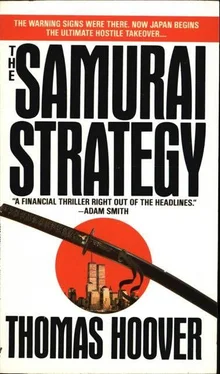Thomas Hoover - The samurai strategy
Здесь есть возможность читать онлайн «Thomas Hoover - The samurai strategy» весь текст электронной книги совершенно бесплатно (целиком полную версию без сокращений). В некоторых случаях можно слушать аудио, скачать через торрент в формате fb2 и присутствует краткое содержание. Жанр: Триллер, на английском языке. Описание произведения, (предисловие) а так же отзывы посетителей доступны на портале библиотеки ЛибКат.
- Название:The samurai strategy
- Автор:
- Жанр:
- Год:неизвестен
- ISBN:нет данных
- Рейтинг книги:5 / 5. Голосов: 1
-
Избранное:Добавить в избранное
- Отзывы:
-
Ваша оценка:
- 100
- 1
- 2
- 3
- 4
- 5
The samurai strategy: краткое содержание, описание и аннотация
Предлагаем к чтению аннотацию, описание, краткое содержание или предисловие (зависит от того, что написал сам автор книги «The samurai strategy»). Если вы не нашли необходимую информацию о книге — напишите в комментариях, мы постараемся отыскать её.
The samurai strategy — читать онлайн бесплатно полную книгу (весь текст) целиком
Ниже представлен текст книги, разбитый по страницам. Система сохранения места последней прочитанной страницы, позволяет с удобством читать онлайн бесплатно книгу «The samurai strategy», без необходимости каждый раз заново искать на чём Вы остановились. Поставьте закладку, и сможете в любой момент перейти на страницу, на которой закончили чтение.
Интервал:
Закладка:
Maybe we were finally about to uncover everybody's real agenda.
Again my mind went back to ken and kan, Miyamoto Musashi's famous discourse on mental attitude in The Way of the Warrior, which he called heiho kokoro mochi no koto. What was merely appearances, ken, and what was kan, the global picture, the essence?
Noda had temporarily gained the upper hand, but now I realized that was almost to be expected. After all, he was a swordsman with decades of experience. So much for ken, my superficial observation. The real truth, kan, lay much deeper. And like all such truths it had to be elementary, elegantly simple.
Which left only two possibilities. Either Matsuo Noda was merely an insane genius about to show us the inner workings of the massive organization he now controlled, or he planned to kill us.
Or both.
CHAPTER TWENTY
Dr. Kenji Asano gazed out the window of his office at the Institute, the last shafts of sun casting long shadows in the canyons below. It was late Tuesday afternoon, and gales of December wind tunneled around the skyscrapers of Tokyo, chilling the gray steel and glass. The blank computer screens reflected back his smooth, trim face, his glum eyes. Technology. It was divorcing man from all sensibility. What Kenji Asano found himself wanting at that moment was not high-tech but high-touch, to be seated on the tatami of his Tokyo teahouse, smelling the fresh straw, gazing out over the manicured evergreen shrubs of his garden, the clumps of leafless black bamboo. He recalled again the tea ceremony in Kyoto and the sight of Tamara approaching down the stepping stones of the "dewy path." She was a rare American, one who understood the essence of cha-no-yu-inner power shows itself in outer restraint.
As he lit a Peace cigarette with a wooden match and continued to examine the cheerless skyline of Tokyo, a thought flickered past-Bodhidharma, the first Zen master, who had plucked away his eyelids to prevent sleep as he meditated. That reflection led naturally to ruminations on the master's disciple, Hui-ko, who sat zazen for days in the snows outside Shao-lin monastery, then finally severed his own arm and offered it to the master as testament of his devotion.
Bushido, the code of the samurai. Who today would cut off an arm to prove determination? Or be Benkei at the Bridge, the servant who breaks the rules of society and cudgels his own master to protect their disguise and deceive their foes. That famous episode, he told himself, would be his model. Sometimes bushido required you to circumvent tradition and honor for the greater good.
What was happening in Japan? These days many thoughtful Japanese were expressing open concern, even fear, over their country's rising nationalism. Although high officials still couched their flag-waving in coded language intended to elude foreign notice, many prominent voices were now suggesting "it's wrong to think prewar Japan was all bad." The latest school textbooks spoke glowingly of the country's Imperial traditions. Encouraged by this jingoism, in truth veiled racism, many superpatriots were beginning to emerge from obscurity. Now, with the Imperial sword as symbol, the Japanese right was openly on the march. Surely Noda had known it would happen, had counted on it.
He recalled the line by Yeats, "And what rough beast, its hour come round at last…"
The "beast," Kenji Asano feared, had arisen in Japan. And its monstrous head was none other than Matsuo Noda. Who could have suspected the dark side of Noda's grand design or the extent of his determination? Violence, money in the billions, and accomplices where they were least suspected. Perhaps even inside MITI.
This last disturbing prospect had convinced Kenji Asano that the time for operating within the rules was past. He had already taken a first step, aided unwittingly by a bureaucrat of immense ambition within the ministry. His first counterploy against Noda had bought time-how much he didn't know- but the next move must be decisive.
He glanced around his office, then at the MITI reports stacked high on his desk. Benkei at the Bridge. For Kenji Asano only one course was left. He would now have to use his own master, MITI, to destroy Matsuo Noda.
His mind went back to the meeting at his MITI office Monday of the previous week. Although he was on temporary assignment at the Institute, he still checked in daily at the ministry. Filing into his office at nine-thirty sharp had been the three men whose "consensus" was crucial. The difficulty was, they must never know what he planned.
Michio Watanabe, International Trade Policy Bureau, Trade Research Section: heavyset, early fifties, a professional bureaucrat with powerful eyes and a permanent expression of skepticism. He had been a close colleague of Noda's for decades.
Tanzan Kitano, Industrial Policy Bureau, International Enterprises Section: gray hair tinged with silver, immaculate dresser, spoke five languages. He had been in MITI over twenty years and had maintained the same mistress for fifteen: a man respected for his long-range thinking.
Hiromu Ikeda, Industrial Technology Agency: late thirties, thrived on expediency, doing the job no matter the consequences. Part of a hard new breed, he was Japan's future. And MlTI was his future.
While the men moved toward the wide couch across from his desk, Kenji Asano opened with offhand pleasantries, directed mainly toward Watanabe, partly because he was eldest and partly to sound out his mind-state. Next he welcomed Kitano with a few inquiries concerning his wife and son, a transparent formality since he was known far and wide to despise them both. Finally he greeted Ikeda and indicated the meeting would be short, knowing the younger man liked to move directly to matters at hand and regarded the usual preliminaries as an old-fashioned waste of time.
Agenda: The American companies Matsuo Noda was acquiring. A proposition had surfaced (in Japanese bureaucracies, all ideas are anonymous and thus devoid of repercussions) that certain MITI personnel be put on leave of absence to serve on the boards of those U.S. concerns. Given the heavy participation of Japanese monies in Noda's American program, perhaps a more formal monitoring mechanism would be helpful to head off potential anxiety in Tokyo's financial community.
The idea, of course, was Kenji Asano's. He had first laid the groundwork with a few oblique hints to several of Dai Nippon's major institutional backers, particularly the Dai-Ichi Credit Corporation, Ltd. That move had borne fruit. Within days they had begun wondering aloud whether the ministry might wish to consider helping oversee Noda's American investments. So far, so good. Now MITI itself had to be convinced. This meeting would undoubtedly be the first of many, resulting eventually in a consensus. Would the ministry go along?
Having set forth the topic, Kenji Asano surrendered the floor to Watanabe, the senior man present-and therefore the one whose views, in keeping with convention, would be listened to and applauded by everyone else in the room whether they agreed or not.
"In my judgment, the original objectives of Matsuo Noda and Dai Nippon are the most desirable means of maintaining the long-term security of Japan," Watanabe declared. "It is in our strategic interest that he be allowed to succeed. Which is why MITI should stay 'hands-off,' should limit its participation to an advisory capacity, nothing more. Anything further could well prove extremely counterproductive in our relations with the United States. We do not need more friction."
"So deshoo, Watanabe-san." Kitano, the man second in seniority, nodded after a moment's pause. "I totally concur with the basic aspects of the viewpoint you have expressed." He was telling everybody he hadn't made up his mind.
"I also support fully Watanabe-san's insightful summary of the relevant issues." Ikeda spoke up, his honorifics far more polite than necessary, a signal. "Keredomo (however)… it might possibly be prudent to examine briefly the considerations advanced by those who differ with this wise assessment in order that we may counter their concerns more thoughtfully."
Читать дальшеИнтервал:
Закладка:
Похожие книги на «The samurai strategy»
Представляем Вашему вниманию похожие книги на «The samurai strategy» списком для выбора. Мы отобрали схожую по названию и смыслу литературу в надежде предоставить читателям больше вариантов отыскать новые, интересные, ещё непрочитанные произведения.
Обсуждение, отзывы о книге «The samurai strategy» и просто собственные мнения читателей. Оставьте ваши комментарии, напишите, что Вы думаете о произведении, его смысле или главных героях. Укажите что конкретно понравилось, а что нет, и почему Вы так считаете.












